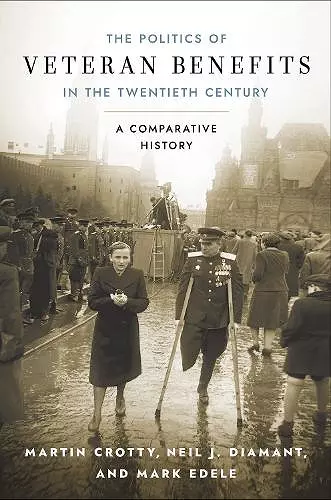The Politics of Veteran Benefits in the Twentieth Century
A Comparative History
Mark Edele author Neil J Diamant author Martin Crotty author
Format:Hardback
Publisher:Cornell University Press
Published:15th Oct '20
Should be back in stock very soon

What happened to veterans of the nations involved in the world wars? How did they fare when they returned home and needed benefits? How were they recognized—or not—by their governments and fellow citizens? Where and under what circumstances did they obtain an elevated postwar status?
In this sophisticated comparative history of government policies regarding veterans, Martin Crotty, Neil J. Diamant, and Mark Edele examine veterans' struggles for entitlements and benefits in the United States, the United Kingdom, Japan, Taiwan, the Soviet Union, China, Germany, and Australia after both global conflicts. They illuminate how veterans' success or failure in winning benefits were affected by a range of factors that shaped their ability to exert political influence. Some veterans' groups fought politicians for improvements to their postwar lives; this lobbying, the authors show, could set the foundation for beneficial veteran treatment regimes or weaken the political forces proposing unfavorable policies.
The authors highlight cases of veterans who secured (and in some cases failed to secure) benefits and status after wars both won and lost; within both democratic and authoritarian polities; under liberal, conservative, and even Leninist governments; after wars fought by volunteers or conscripts, at home or abroad, and for legitimate or subsequently discredited causes. Veterans who succeeded did so, for the most part, by forcing their agendas through lobbying, protesting, and mobilizing public support. The Politics of Veteran Benefits in the Twentieth Century provides a large-scale map for a research field with a future: comparative veteran studies.
This insightful text contains fascinating discussions of various forms of power (or lack thereof) wielded by veterans during immediate and later postwar efforts in both victorious and defeated countries following different conflicts in the 20th century. An astute work. Highly recommended.
(Choice)The writing is by turn learned, acerbic, impressively lucid. The authors have produced a clear and compelling argument, and they are to be applauded for staring down the challenges of interdisciplinarity and tackling such an enormous topic with confidence.
(Australian Book Review)This book gives inspiring leads for anyone working on veterans.
(Journal of Power Institutions in Post-Soviet Societies)By providing historians with the theoretical framework necessary to make sense of a diverse range of accounts, and by connecting their scholarship with the larger social science literature on welfare and social movements, this groundbreaking work will make it easier for scholars interested in veterans both to form a more coherent subfield and to make a compelling case for the broader relevance of their work.
(Journal of Military History)The Politics of Veteran Benefits in the Twentieth Century is a relevant, informative, and accessible book with insights relevant for academics working in various disciplines – namely, history, political science, and sociology – as well as for politicians, practitioners, activists, veterans, veterans' organizations, and the public.
(International Sociology ReviISBN: 9781501751639
Dimensions: 229mm x 152mm x 24mm
Weight: 454g
240 pages